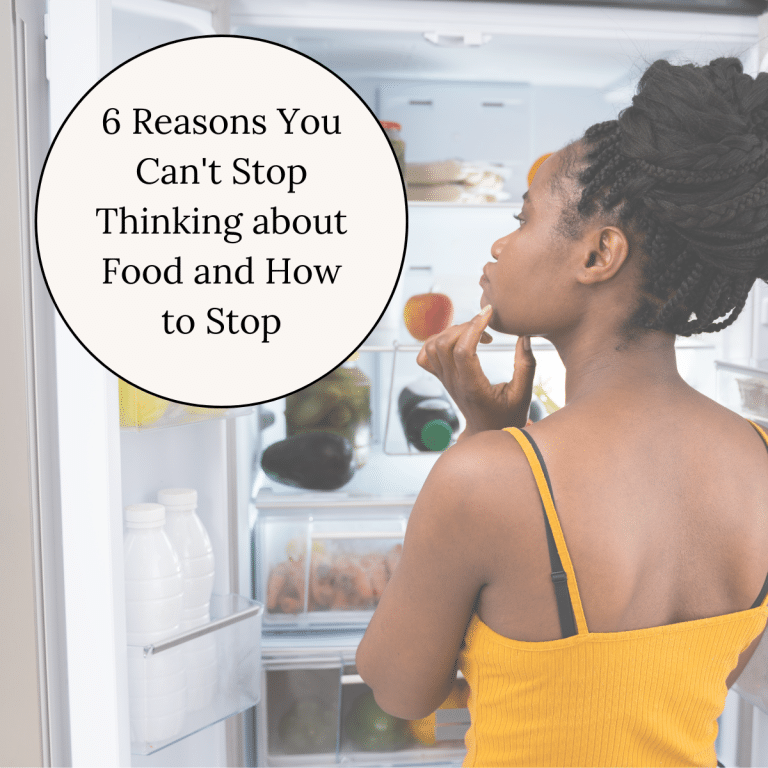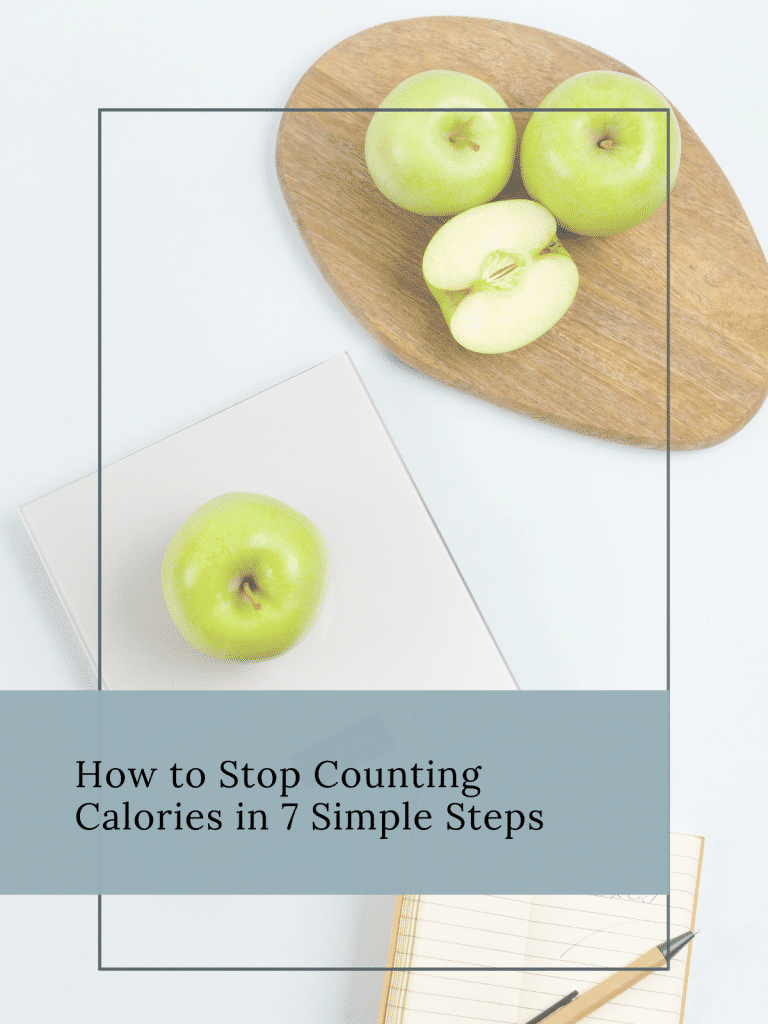How to Stop Dieting: 12 Tips to Ditch Diets and Eat Normally
Ready to stop dieting for good? If you feel stuck in a restrict-binge cycle and are ready to ditch diets, but don’t know where to start, these top tips will help you get started.
Why should you stop dieting?
In short, diet’s don’t work. Dieting is a predictor of weight gain, it slows your metabolism, and rarely leads to long-term health benefits. If you’re still on the fence about whether or not dieting is for you, read the 10 Disadvantages of Dieting to learn more about the harmful effects of diets.
If you are done with the restriction, binging, obsessive thoughts and exhausting rules, then you are in the right place. Dieting can take a toll on our mental, physical and emotional well-being, and the tips in this article will get you out of this cycle.
What can you do instead of dieting?
Some good (great!) news: there’s another way to eat and live your life. It’s called Intuitive Eating. Intuitive Eating is a self-care framework backed by research that uses internal body cues paired with science to guide us to a more joyful way of eating.
The benefits of intuitive eating range from improved physical and mental health, better body image, fewer cravings, less obsession with food, and more.
For those of you concerned about weight, intuitive eaters are known of have a more stable weight and a lower BMI than dieters (how’s that for ironic?), and weight-neutral (meaning weight loss is not the goal) interventions improve health independent of weight loss.

12 tips to stop dieting
Ready to finally stop yoyo dieting and learn to eat to take care of yourself? Here are our top tips from a registered dietitian and certified intuitive eating counselor.
Get clear on why you want to ditch diets
It’s essential to know exactly why you are ditching diets. And write it down somewhere. Many of our clients find it especially helpful to write out a pro and cons list of dieting vs. giving it up. You could start with some of the reasons diets haven’t worked for you.
This is because when it gets tough and you’re tempted to try another diet, it can be useful to consult your “North Star” and remember why you are doing this in the first place.
If you need a reminder of why stopping dieting is the best thing to do for your well-being, check out our article on the disadvantages of dieting.
Explore beliefs about weight and health
The fear of gaining weight is often a common barrier to ditching dieting entirely and embracing intuitive eating. This is completely normal and a direct result of living in a society that praises thinness.
Understanding existing beliefs about weight and health and how that keeps you stuck in the dieting cycle is an essential part of the process. (This is what makes up much of the “U” in our UNDIET method that we use to successfully help women live life without diets).
Once you’ve identified your current beliefs you can begin to unlearn them, stop dieting, and ultimately achieve food freedom.
Audit your diet rules
In order to actually stop dieting, you need to be aware of diet rules you might be living by (even if you’re not on a diet)
Write down any rules you have about eating, including what foods you are allowed to eat and when it’s OK to eat (or not). Determine if they are serving you or whether they are actually detrimental to your physical and mental wellbeing. Then, rather than going cold turkey, you can tackle each rule one-by-one.
Remember, some dieting rules are a little more sneaky than others. An example of a pseudo-dieting rule is always choosing whole wheat bread over white. Questioning these habits you live by and unpacking whether diet culture is at play can help you break away from the even less obvious rules and restrictions.
Throw away the scale! (And all the other dieting paraphernalia)
This step can be both terrifying and empowering! Throw away the scale(s), delete food tracking apps, and toss old diet books and any other dieting paraphernalia like portion control containers. This is the first step to committing to a new way of living and rebuilding your relationship with food and your body.
Not ready to give up your scale? Try putting it away somewhere you don’t see it. That could be a high shelf in a closet you don’t frequent, under a guest bed, in your garage, or in a shed (yes, we’ve had clients do this).
You’ll also want to ditch the food tracking apps and work on learning to stop counting calories.
Get in touch with your body’s hunger and fullness cues
If you are a chronic dieter and have been restricting for a long time recognizing your hunger and fullness cues can be challenging. Learning to honor your own hunger and fullness cues rather than following diet rules of when and how much to eat moves you toward food freedom.
If you’ve dieted for most of your life, you may not even know what it’s like to feel full or how you experience hunger. Over time you will learn to trust your body’s cues and let go of diet rules.
Start to eat regular meals with a balance of macronutrients
One way to reconnect with hunger and fullness is to actually eat more regularly (every three to four hours) and make sure you’re eating well-balanced meals. This can also help reduce cravings (especially sugar and carb cravings), which will help you feel more in control around food.
That’s because meals that contain a balance of macronutrients (protein, carbohydrates and fats) not only help you feel full for longer, but you’ll also feel more satisfied.
Inside The UNDIET Method you learn a simple, easy-to-follow formula to build meals that fill you up, satisfy you, and keep cravings at bay.
Focus on how food makes you feel physically and emotionally
Despite what diet culture wants you to think, food isn’t just fuel. Foods hold cultural meaning, can hold great memories and bring us pleasure. Part of learning to trust your body (instead of using diet rules) is to notice how food makes you feel.
A few helpful questions to ask yourself about food:
- Does it give you energy or does it make you want to take a nap?
- Does it taste good or are you choking it down because you think it’s the “healthy” choice?
- Does it keep you full for several hours or are you hungry again in 30 minutes?
- Does it bring you joy or are you feeling anxious after you eat?
Begin to incorporate forbidden or off-limit foods
Beginning to incorporate forbidden foods back into your life is an essential part of rebuilding your relationship with food. It’s also one of the hardest steps because it’s almost never as easy as just eating the cookie.
Not everyone is ready for this step, and that is OK. In fact, having the support of an intuitive eating dietitian can be incredibly helpful in this process. Want support? Learn more about working with us on your diet-free journey.
Remove perfectionism
Dieting tells us that if we aren’t 100 percent “in,” then we’ve failed. That’s one of the many reasons they don’t work. Letting go of the need to eat perfectly can be both uncomfortable and freeing.
Start by just noticing your perfectionist tendencies, and then tackle each one as they come. Mantras or affirmations can be especially helpful here.
Find community
Ditching diets, rejecting the idea of international weight loss, and embracing your body is a radical act—one that not everyone in your life will understand.
Finding a community of like-minded people who are also embracing intuitive eating and the non-diet approach can be the difference between staying the course when things feel hard and giving up.
You can start simply by curating your social media feed to be filled with like-minded accounts and listening to podcasts on intuitive eating. There are also virtual or in person non-diet communities that you may be able to join.
Set boundaries
If your friends and family are still on the dieting bandwagon it can be helpful to set boundaries. If it feels safe to you, you can gently let them know that you are trying a new approach and would appreciate it if weight loss, dieting, and people’s bodies are no longer topics of conversation.
You can also unfollow or mute people on social media to gives yourself space from those messages.
Find support by working with a professional
Breaking away from dieting and diet culture can be an emotional rollercoaster. Rejecting diets goes against the grain and can be challenging in a world full of people trying to lose weight.
That’s where working with a a non-diet professional who practices intuitive eating can be incredibly helpful. Get started on your journey by joining our free training “How to Feel in Control Around All Foods (without diets or willpower)” where you’ll learn:
- How our client Jeanne, for the first time in her adult life, can now relax and enjoy food without counting, measuring, worrying, and restricting. This was after decades of dieting, which only left her with sugar cravings, binge-like behaviors, and feeling like a failure.
- The 3 biggest reasons dieting leads to low energy, sugar or carb cravings, and can’t stop eating when you’re full.
- Why traditional tips like getting food out of the house, portion control, cutting out carbs and sweets, or counting calories are actually making your cravings worse, causing you to over eat, and making you feel more out of control around foods.
- The exact steps you need to take to finally ditch diets and go from stressed and out of control around food to confident and free
Final Thoughts
Untangling yourself from diet culture can take time. Think how long you’ve been dieting! Giving yourself a break and practicing self-compassion on your journey to stopping dieting can go a long way in helping you finally break free from the cycle and enjoy food freedom.







4 Comments